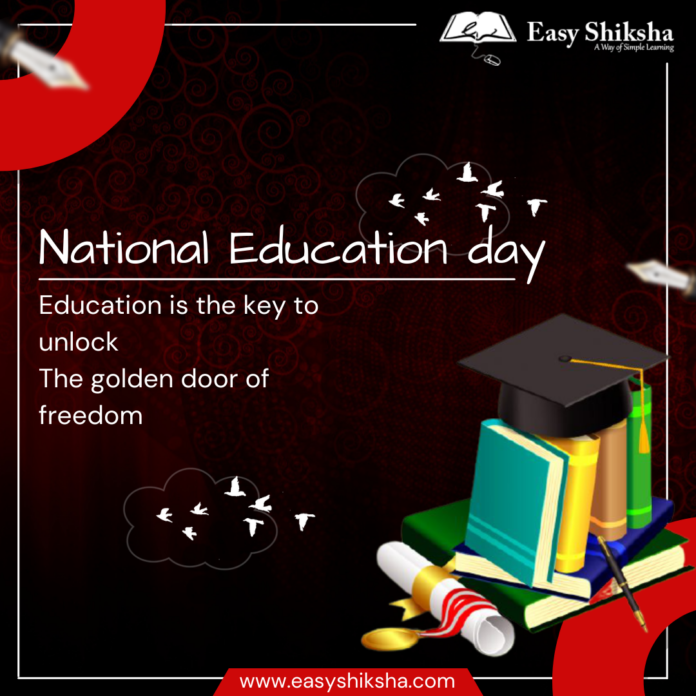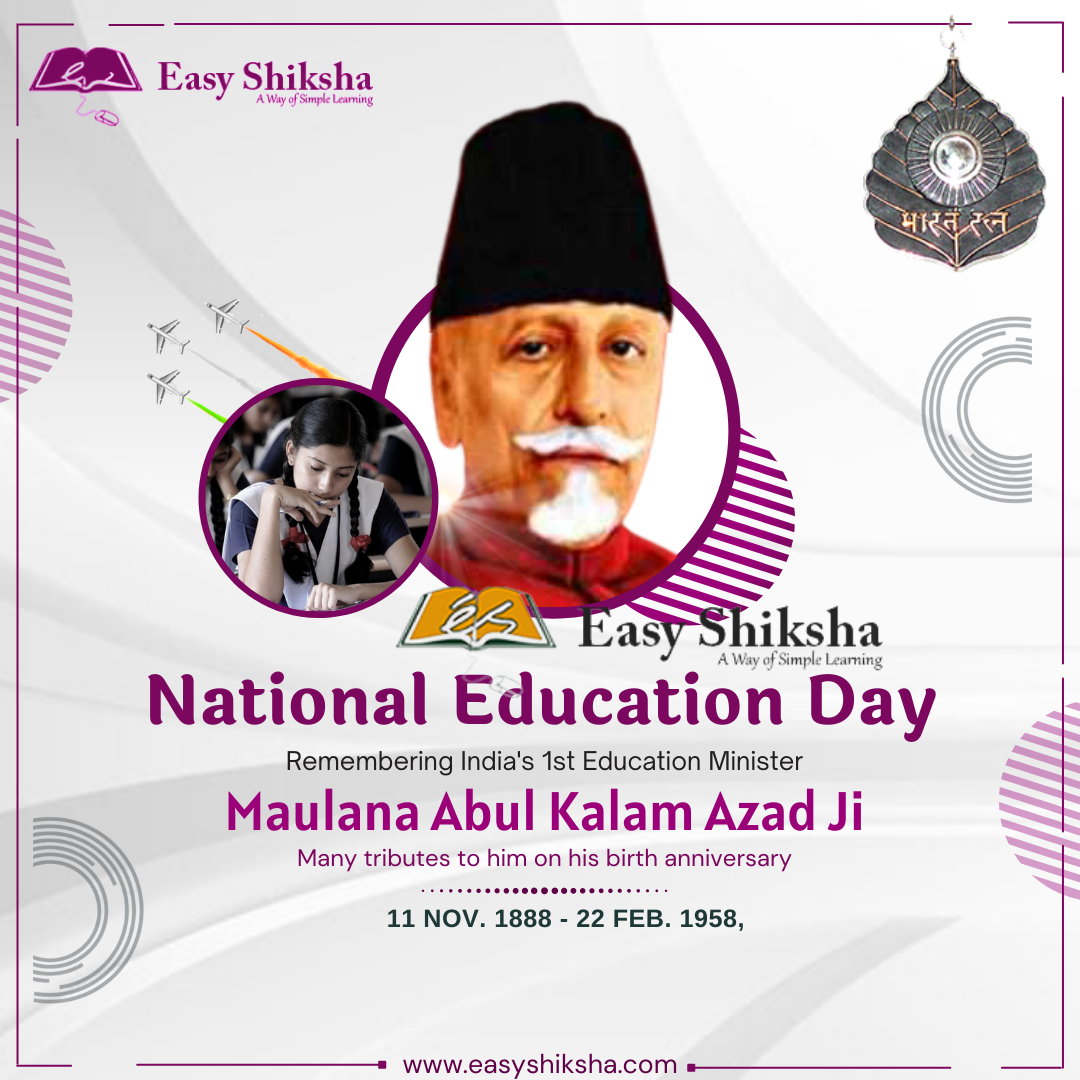Every Year on 11th November on the birth anniversary of Maulana Abdul Kalam Azad we are celebrating National Education Day. He was the first education minister of the independent India who served from 15th August 1947 to 2nd February 1958.
National Education day was first time celebrated on 11th Nov 2008 as this was decided by The Ministry of Human Resource Development on 11th September 2008. “The Ministry has decided to commemorate the birthday of this great son of India by recalling his contribution to the cause of education in India. November 11 every year, from 2008 onwards, will be celebrated as the National Education Day, with declaring it as a holiday.” All educational institutions in the country mark the day with seminars, symposia, essay-writing, elocution competitions, workshops and rallies with banner cards and slogans on the importance of literacy and the nation’s commitment to all aspects of education

Important Announcement – EasyShiksha has now started Online Internship Program “Ab India Sikhega Ghar Se”

Q. Are EasyShiksha's internships truly free?
Yes, all internships offered by EasyShiksha are completely free of charge.
Q. How can I apply for an internship with EasyShiksha?
You can apply by visiting our website, browsing available internships, and following the application instructions provided.
Q. What types of internships are available through EasyShiksha?
EasyShiksha offers a wide range of internships across technology, business, marketing, healthcare, and more. Opportunities are continuously updated.
Q. Will I receive a certificate upon completing an internship?
Yes, upon successful completion, you will receive a certificate recognizing your participation and achievements.
Q. Are EasyShiksha's internship certificates recognized by universities and employers?
Yes, the certificates are recognized by universities, colleges, and employers worldwide.
Q. Is the download of certificates free or paid?
Access to internships and courses is free, but there is a small fee to download certificates, covering administrative costs.
Q. When can I start the course?
You can choose any course and start immediately without delay.
Q. What are the course and session timings?
These are fully online courses. You can learn at any time and pace. We recommend following a routine, but it depends on your schedule.
Q. What will happen when my course is over?
After completion, you will have lifetime access to the course for future reference.
Q. Can I download the notes and study material?
Yes, you can access and download course materials and have lifetime access for future reference.
Q. What software/tools would be needed for the course?
All necessary software/tools will be shared during the training as needed.
Q. I’m unable to make a payment. What should I do?
Try using a different card or account. If the problem persists, email us at info@easyshiksha.com.
Q. Do I get the certificate in hard copy?
No, only a soft copy is provided, which can be downloaded and printed if required.
Q. The payment got deducted but shows “failed”. What to do?
Technical errors may cause this. The deducted amount will be returned to your account in 7-10 working days.
Q. Payment was successful but dashboard shows ‘Buy Now’?
Sometimes payment reflection is delayed. If it takes longer than 30 minutes, email info@easyshiksha.com with the payment screenshot.
Q. What is the refund policy?
If you face technical issues, you can request a refund. No refunds are issued once the certificate has been generated.
Q. Can I enroll in a single course?
Yes, select the course of interest, fill in the details, make payment, and start learning. You will also earn a certificate.
Q. My questions are not listed above. I need further help.
Contact us at info@easyshiksha.com for further assistance.
Who was Maulana Abdul Kalam Azad
Azad, a freedom fighter, served India in the capacity of minister of education from 1947 to 1958. He is known for making several significant contributions in the field of education.
After independence in 1947, India struggled to completely revamp and stabilize its institutions and sectors. Recognizing that education would be crucial for nation-building, the leaders of the country shifted their focus towards education. Abul Kalam, in particular, served as the flag bearer for this cause. Speaking in 1948 at All India Education, he highlighted the importance of this birthright of every person to receive basic education necessary for their well-being, without foregoing their duties as a citizen.

As a freedom fighter and academician, Azad was the best fit for the role of Education Minister for independent India. Illiteracy was a major hurdle for the development of the country, which had already struggled and suffered through years of exploitation prior to it gaining status as a separate nation.
Top Courses in Software Engineering
Dr. Dishan Kamdar, Vice-Chancellor, FLAME University says, “Today India’s literacy rate stands at around a plus 70% from a mere 12% in 1947, which is no mean feat. As we celebrate the National Education Day today – the birth anniversary of Maulana Abdul Kalam Azad, it is an occasion for all of us to acknowledge his exemplary contribution towards laying the foundation for the Indian education system post-independence. Going ahead, the academic fraternity and institutions in the country must take on the responsibility towards providing global quality, cutting-edge education that will prepare our young people for a successful future.”
Himanshu, Co-Founder of unlu says “For Gen Z, creative learning has become equally important as elementary education. Over 40% of this generation will end up becoming creators in some or the other field. With the creative learning space growing at over 50% CAGR, we at unlu are extremely excited and fortunate to be enabling India’s next generation with the much needed learning and skills, which will help shape India’s future economy!”
Dr. Richa Mishra, Assistant Director of the Centre for Communication & Critical Thinking, JK Lakshmipat University says“The ongoing coronavirus pandemic is acting as a catalyst for bringing the much-needed change in higher education. The influx of digital technology into education is paving the way towards a healthier and stronger education ecosystem by making the curriculum design and delivery more efficient and fruitful. However, we still have to go a long way . We have to identify the challenges and opportunities of research innovations and incubation centres for their potential use across the globe. Teaching, learning and innovation should happen at the intersection of design, engineering and management. It’s high time that the impetus should be on integrated and holistic education by incorporating credit-based courses in Critical Thinking, Problem Solving, Communication, Social, Emotional and Ethical learning”
Dr. G.Pardha Saradhi Varma, Vice Chancellor, KL Deemed-to-be-University says “In my view, the pandemic has compelled us to adapt to the new changes which were due for quite some time. The adoption of digital technology by the education sector will pave the way for an impactful and stealthier curriculum design which will enhance the impact of teaching as well as learning. We need to identify the challenges and focus on research innovations to cultivate a much better talent availability that can start contributing from day 1 of employment. It’s high time that the impetus should be on the integration of teaching, learning, research, and innovation,”
Mr.Prajodh Rajan, Co-founder and Group CEO, Lighthouse Learning says “We proudly remember Maulana Abul Kalam Azad’s contribution in laying the foundations of the education system in the country. It has been a long journey since a solid education system was established; getting on ahead, educational institutions in the country must strive towards providing quality and sustainable education. It is excellent to witness many educational institutions across the country bringing a fresh perspective, adopting new-age learning methodologies and taking steps at integrating the new education policy as we step into a decade of education transformation starting 2022”
Empower your team. Lead the industry
Get a subscription to a library of online courses and digital learning tools for your organization with EasyShiksha
Request NowEducation Day significance & celebration
November 11 is celebrated every year in schools by conducting various interesting and informative seminars, symposia, essay-writing, rallies, etc. Students and teachers come together to talk about the importance of literacy and the nation’s commitment to all aspects of education.
National education day is also a tribute to all the great contributions made by Maulana Abdul Azad in the field of the education system of Independent India.
ALSO READ: National Education Day: Quotes
Understanding the integral role played by a healthy education system for the development of the country, as Chairman of the Central Advisory Board of Education, Maulana Abul Kalam was the driving force towards the eradication of illiteracy. He emphasised heavily on elementary education and propagated the expansion of secondary education, especially for girls.
But perhaps his largest contribution is the Indian Institutes of Technology. Under his leadership, the first IIT was inaugurated in 1951. Abul Kalam truly believed in the potential of establishing IITs for the progression of research and technological advancement in India.
For more related content visit Easyshiksha and Hawkscode
ALSO READ: international-migrants-day
Get Course: AWS-for-Beginners




































































